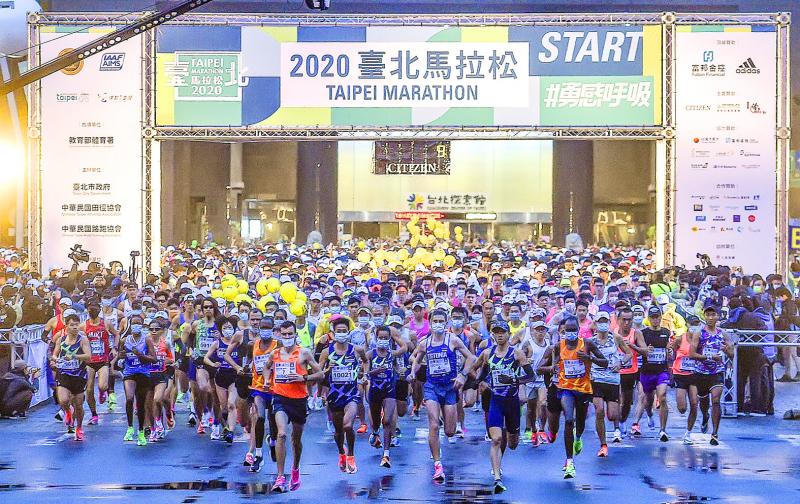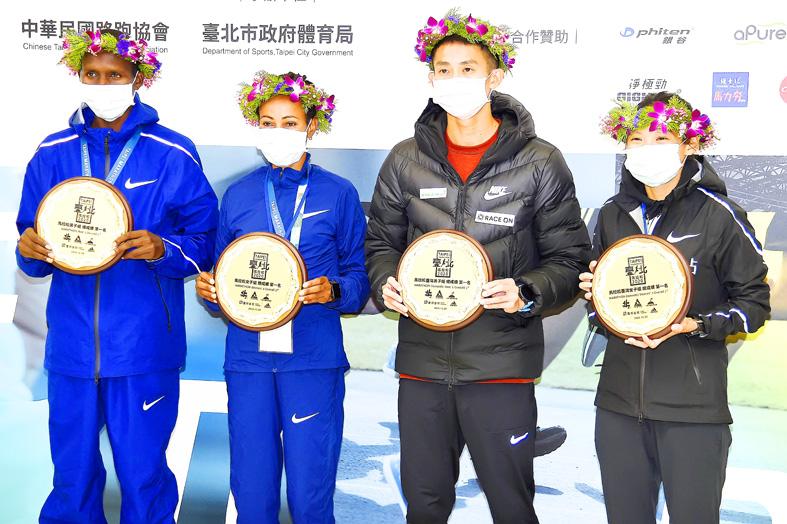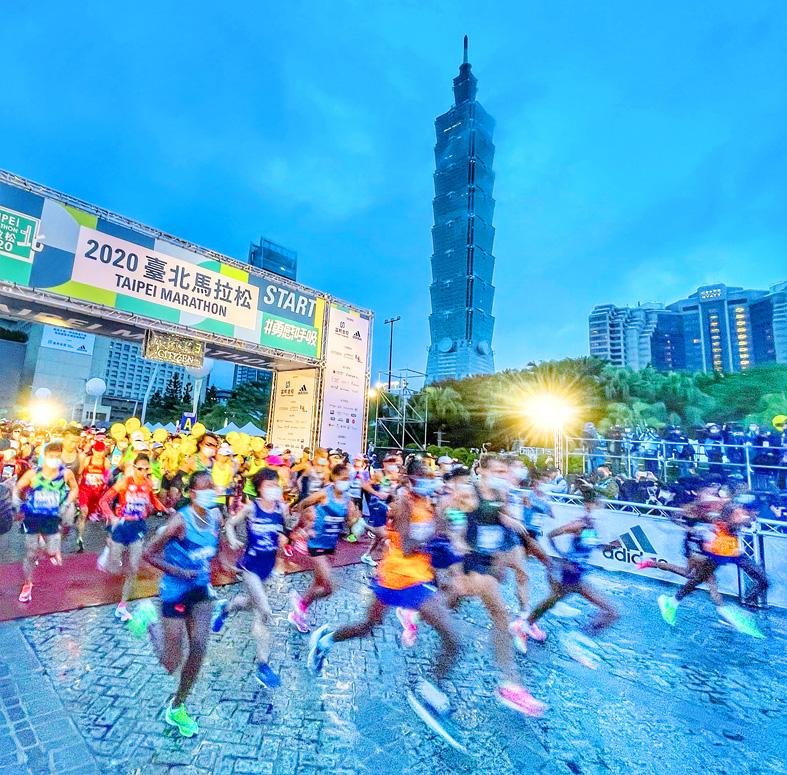About 28,000 runners yesterday morning hit the road in the annual Taipei Marathon, with Taipei Mayor Ko Wen-je (柯文哲) saying that the event might be the only large-scale city marathon held in the world this year amid the COVID-19 pandemic.
The runners, mostly wearing masks, gathered in front of Taipei City Hall in cold and rainy weather before sunrise as they waited for Ko to fire the starting shot at 6:30am.
Ko said that since its launch in 1986, the Taipei Marathon has become part of Taipei’s city branding and an important event to promote international tourism.

Photo: Chen Chih-chu, Taipei Times
A total of 3,692 foreign nationals from more than 60 countries attended the race in 2018, he said.
More than 37,000 people registered to join this year’s race, but to maintain quality, only 28,000 people were selected through a lottery, he added.
The Taipei Marathon is the first marathon in the nation to obtain the World Athletics Bronze Label Road Race certification, and its routes are certified by the Association of International Marathons and Distance Races, but the city government is still working to improve the event and obtain the Platinum Label, Ko said.

Photo: Chen Chih-chu, Taipei Times
The slogan of this year’s marathon was “Dare to breathe” to encourage the runners to challenge themselves and show gratitude to the disease prevention personnel for their efforts to protect people from COVID-19 so that runners could take big breaths and run toward the finish line, the organizers said.
“This event might be the largest marathon held in the world since the pandemic broke out,” Ko said. “We want to thank all the disease prevention personnel for their continuous efforts, so that we can have such impressive success in fighting COVID-19.”
Runners were required to wear a mask at the starting point and after crossing the finish line, while spectators were required to wear a mask at all times during the event.

Photo: CNA
Ko urged people to continue to wear masks and wash their hands frequently to maintain Taiwan’s good disease prevention performance.
The Taipei Department of Sports said that 12 top runners from other countries were invited to join the race this year.
They underwent a 14-day mandatory quarantine, during which treadmills were provided at their hotels for them to practice, and were tested for COVID-19 several times before the race.
Kenyan runner Paul Lonyangata won in the men’s division, finishing in 2 hours, 9 minutes and 18 seconds, setting a record for the Taipei Marathon, while Ethiopian runner Askale Wegi won in the women’s division, finishing in 2 hours, 28 minutes and 31 seconds.

Conflict with Taiwan could leave China with “massive economic disruption, catastrophic military losses, significant social unrest, and devastating sanctions,” a US think tank said in a report released on Monday. The German Marshall Fund released a report titled If China Attacks Taiwan: The Consequences for China of “Minor Conflict” and “Major War” Scenarios. The report details the “massive” economic, military, social and international costs to China in the event of a minor conflict or major war with Taiwan, estimating that the Chinese People’s Liberation Army (PLA) could sustain losses of more than half of its active-duty ground forces, including 100,000 troops. Understanding Chinese

The Ministry of Foreign Affairs (MOFA) yesterday said it is closely monitoring developments in Venezuela, and would continue to cooperate with democratic allies and work together for regional and global security, stability, and prosperity. The remarks came after the US on Saturday launched a series of airstrikes in Venezuela and kidnapped Venezuelan President Nicolas Maduro, who was later flown to New York along with his wife. The pair face US charges related to drug trafficking and alleged cooperation with gangs designated as terrorist organizations. Maduro has denied the allegations. The ministry said that it is closely monitoring the political and economic situation

UNRELENTING: China attempted cyberattacks on Taiwan’s critical infrastructure 2.63 million times per day last year, up from 1.23 million in 2023, the NSB said China’s cyberarmy has long engaged in cyberattacks against Taiwan’s critical infrastructure, employing diverse and evolving tactics, the National Security Bureau (NSB) said yesterday, adding that cyberattacks on critical energy infrastructure last year increased 10-fold compared with the previous year. The NSB yesterday released a report titled Analysis on China’s Cyber Threats to Taiwan’s Critical Infrastructure in 2025, outlining the number of cyberattacks, major tactics and hacker groups. Taiwan’s national intelligence community identified a large number of cybersecurity incidents last year, the bureau said in a statement. China’s cyberarmy last year launched an average of 2.63 million intrusion attempts per day targeting Taiwan’s critical

AGING: As of last month, people aged 65 or older accounted for 20.06 percent of the total population and the number of couples who got married fell by 18,685 from 2024 Taiwan has surpassed South Korea as the country least willing to have children, with an annual crude birthrate of 4.62 per 1,000 people, Ministry of the Interior data showed yesterday. The nation was previously ranked the second-lowest country in terms of total fertility rate, or the average number of children a woman has in her lifetime. However, South Korea’s fertility rate began to recover from 2023, with total fertility rate rising from 0.72 and estimated to reach 0.82 to 0.85 by last year, and the crude birthrate projected at 6.7 per 1,000 people. Japan’s crude birthrate was projected to fall below six,